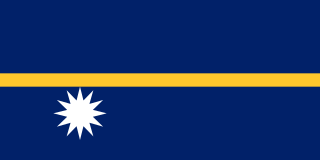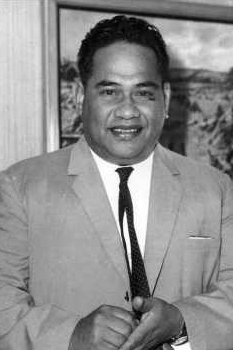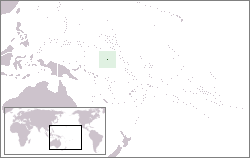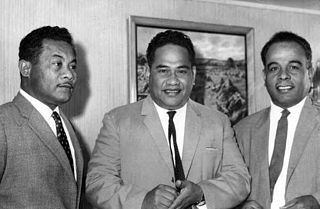
Nauru, officially the Republic of Nauru and formerly known as Pleasant Island, is an island country and microstate in Micronesia, part of Oceania in the Central Pacific. Its nearest neighbour is Banaba of Kiribati, about 300 km (190 mi) to the east.

The history of human activity in Nauru, an island country in the Pacific Ocean, began roughly 3,000 years ago when clans settled the island.

The demographics of Nauru, an island country in the Pacific Ocean, are known through national censuses, which have been analysed by various statistical bureaus since the 1920s. The Nauru Bureau of Statistics have conducted this task since 1977—the first census since Nauru gained independence in 1968. The most recent census of Nauru was on 30 October 2021, when population had reached 11,680 people. The population density is 554 inhabitants per square kilometre, and the overall life expectancy is 63.9 years. The population rose steadily from the 1960s until 2006 when the Government of Nauru repatriated thousands of Tuvaluan and I-Kiribati workers from the country. Since 1992, Nauru's birth rate has exceeded its death rate; the natural growth rate is positive. In terms of age structure, the population is dominated by the 15–59-year-old segment (57%). The median age of the population is 21.6, and the estimated gender ratio of the population is 101.8 males per 100 females.

The politics of Nauru take place in a framework of a parliamentary representative democratic republic, whereby the President of Nauru is the head of government of the executive branch. Legislative power is vested in both the government and the parliament. The Judiciary is independent of the executive and the legislature.

Hammer DeRoburt was the first President of the Republic of Nauru, and ruled the country for most of its first twenty years of independence.

Reverend Philip Adam Delaporte was a German-born American Protestant missionary who ran a mission on Nauru with his wife from 1899 until 1915. During this time he translated numerous texts from German into Nauruan including the Bible and a hymnal. He was also one of the first to create a written form for the Nauruan dialect, published in a Nauruan-German dictionary.

The displacement of the traditional culture of Nauru by contemporary western influences is evident on the island. Little remains from the old customs. The traditions of arts and crafts are nearly lost.

Timothy Detudamo was a Nauruan politician and linguist. He served as Head Chief of Nauru from 1930 until his death in 1953.
The British Phosphate Commissioners (BPC) was a board of Australian, British, and New Zealand representatives who managed extraction of phosphate from Christmas Island, Nauru, and Banaba from 1920 until 1981.

Oceania is, to the People's Republic of China and the Republic of China, a stage for continuous diplomatic competition. The PRC dictates that no state can have diplomatic relations with both the PRC and the ROC. As of 2024, eleven states in Oceania have diplomatic relations with the PRC, and three have diplomatic relations with the ROC. These numbers fluctuate as Pacific Island nations re-evaluate their foreign policies, and occasionally shift diplomatic recognition between Beijing and Taipei. The issue of which "Chinese" government to recognize has become a central theme in the elections of numerous Pacific island nations, and has led to several votes of no-confidence.

Nauruan nationality law is regulated by the 1968 Constitution of Nauru, as amended; the Naoero Citizenship Act of 2017, and its revisions; custom; and international agreements entered into by the Nauruan government. These laws determine who is, or is eligible to be, a national of Nauru. The legal means to acquire nationality, formal membership in a nation, differ from the domestic relationship of rights and obligations between a national and the nation, known as citizenship. Nauruan nationality is typically obtained either on the principle of jus soli, i.e. by birth in the Nauru or under the rules of jus sanguinis, i.e. by birth to parents with Nauruan nationality. It can be granted to persons with an affiliation to the country who has lived in the country for a given period of time through naturalization.

Raymond Gadabu was a Nauruan politician who served as Head Chief between 1953 and 1955.
Topics related to Nauru include:

The economy of Banaba and Nauru has been almost wholly dependent on phosphate, which has led to environmental disaster on these islands, with 80% of the islands’ surface having been strip-mined. The phosphate deposits were virtually exhausted by 2000, although some small-scale mining is still in progress on Nauru. Mining ended on Banaba in 1979.

The Japanese occupation of Nauru was the period of three years during which Nauru, a Pacific island which at that time was under Australian administration, was occupied by the Japanese military as part of its operations in the Pacific War during World War II. With the onset of the war, the islands that flanked Japan's South Seas possessions became of vital concern to Japanese Imperial General Headquarters, and in particular to the Imperial Navy, which was tasked with protecting Japan's outlying Pacific territories.

Elections for the Legislative Council for the Territory of Nauru were held for the first and only time on 22 January 1966.

Constitutional Convention elections were held in Nauru on 19 December 1967.
The 1948 Nauru riots occurred when Chinese labourers employed on the phosphate mines refused to leave the island. At the time, Nauru was dominated by Australia as a United Nations trust territory, with New Zealand and the UK as co-trustees.

Nauru–Taiwan relations are relations between the Republic of Nauru and Taiwan, officially the Republic of China (ROC). Official diplomatic relations were first established in 1980. Relations were first severed in 2003, when Nauru opted to recognize the People's Republic of China. Formal bilateral relations with Nauru were reestablished in 2005, and maintained until 2024.
The Council of Chiefs was a Nauruan political body. It was formally established in 1927, and served as an advisory body to the Administrator. It was replaced in 1951 by the Nauru Local Government Council.












